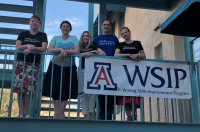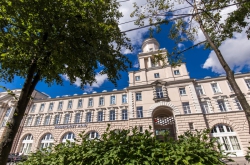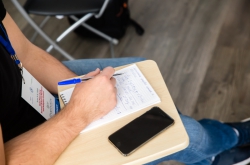In general, academic writing is a linguistic competence that helps a researcher read, understand, and write scientific texts. Nowadays, it has become a prerequisite for successful participation in the scientific community, especially on an international level.
“Academic writing in Russia, i.e. the very language that is used for writing scientific texts (articles, textbooks, etc.) is very different from what has been accepted abroad. Therefore, if a researcher wants to get published in international journals, they have to adapt to a different style of writing. For instance, in the English culture studying writing styles, especially if it’s academic writing, is an integral part of education. Similar to how we have it here, their students write lots of texts. Still, such assignments are more about explaining their point of view. Even if it’s some text that has to do with physics or math,” explains Inna Anokhina, head of ITMO’s Academic Writing Lab and senior lecturer at the Foreign Language Training Center.
She adds that the peculiarities of the English academic writing tradition can be narrowed down to three key points:
1. The English style is more structured.
2. The author expresses their personal thoughts in a very clear, consistent manner.
3. The author is responsible for every word they use. Every word used in an article has its function. The text’s author has to be able to explain why they use each particular term.

Specialists from ITMO’s Academic Writing Lab (AWL) help prepare articles for publication in international scientific journals. The laboratory was launched in 2016, when the university set the course on enhancing its international activities, publication activity of its researchers included. The laboratory’s mission is to support and train students, researchers and staff members of ITMO University at all stages of working with research articles.
The Academic Writing Lab works with all genres of academic writing: research articles, reports, presentations, grant applications, essays, CVs and such. Everyone can get the Lab’s help starting with their Bachelor’s years, for instance if they need to file an application and prepare documents for an internship or exchange program. The laboratory’s specialists can also help you write motivation letters and other accompanying documents. What is more, if a student is already working for some research laboratory or scientific center, they can get expert help in preparing their research for publication and work on these materials under the guidance of AWL’s lecturers.
During the third year of their Bachelor’s programs, ITMO students also have a course in academic writing. ITMO University has become one of the first educational institutions in Russia to introduce this aspect of the English language into its educational program. In the course of their training, students learn how to write scientific articles; the laboratory is always ready to offer additional assistance, if necessary. Still, AWL’s key focus is on preparing research articles and other associated materials. This is why for the most part, it works with PhD students, lecturers, and the university’s research associates.

AWL’s activities
The laboratory’s lecturers offer several kinds of services, all of which are free for ITMO’s members and students.
-
Individual consultations on writing articles and scientific texts
This is the laboratory’s main line of work. You can bring any of your scientific texts, be it research articles, article theses or a chapter of a book and get an individual consultation.
A good idea is to start working on your article by choosing the journal you want to publish it in. Then, you have to study the journal’s requirements to publications and their authors. Oftentimes, those are available on its website, or you can make an inquiry via email.
What makes AWL truly special is that unlike translation bureaus, its specialists don’t work with texts in Russian. This means that you should come to the consultation with some drafts for your article in English. The laboratory’s tutor will offer the necessary assistance while paying attention to the document’s structure, grammatical and lexical errors, and stylistics.
“Depending on the author’s level of English, the tutor will tell them about the peculiarities and important instruments of academic writing, and teach to use them. From then on, the tutor and the author work on the text together, but though the tutor helps with correcting the text, the author has to come with materials of their own, explains Inna Anokhina. This has to do with the laboratory’s educational aspect. Apart from helping with English grammar and writing style, we are also set on improving the researchers’ academic writing skills so that in the future, they would be able to work with texts on their own.”
-
Courses in academic writing
The courses are conducted every semester as extracurricular activities. Each course consists of ten sessions (20 academic hours) that take place when it’s most convenient for both lecturers and students.
As of now, the laboratory offers two courses: “The basics of academic writing” and “Academic writing”. The former is aimed at those who have A2 and B1 levels of English and focuses on basic topics. The second course is designed for ITMO members and students who are more proficient with English (levels B1+ and higher). Its content focuses on such things as style, the more complex grammatical structures, vocabulary, as well as issues that have to do with critical thinking.

This year, the laboratory will launch one more course, “Academic grammar”. According to Inna Anokhina, this course will be useful to those who want to brush up their grammar before studying the more complex issues that have to do with stylistics.
-
Workshops
The workshops conducted by lecturers from the Foreign Languages Department focus on specific topics, such as writing motivation letters, CVs, and other accompanying documents, as well as training in particular sections of English grammar and preparing presentations.
On the whole, the laboratory conducts about four workshops every semester. One of the recent events that took place in May was dedicated to professional communications in the academic community. You can follow AWL’s news and check the schedule of workshops on the university’s webportal.
Future prospects
In the two years of the laboratory’s existence, its members conducted over 500 individual consultations. AWL’s five chief lecturers conduct them on a regular basis, as well as give lectures and organize workshops. Members of the Foreign Languages Department also participate in the laboratory’s work.

The laboratory also develops cooperation with international universities. For one, it has ties with the University of Arizona, and plans to launch a new set of workshops organized in collaboration with its specialists in the fall of 2018.
“We are developing a joint program with the University of Arizona aimed at improving academic writing skills. This fall, we are planning to take our cooperation a step further. We plan to launch new workshops given by members of our partner university. Those will be dedicated to improving academic writing skills, critical thinking and several other topics. What is more, we are set on developing study materials with support from our American colleagues,” comments the head of ITMO’s Academic Writing Lab.
In the upcoming semester, AWL will also hold workshops on working with bibliographic databases such as Mendeley and many others. All of the laboratory’s activities take place at ITMO’s building on Lomonosova 9; participation is free for all ITMO members.





